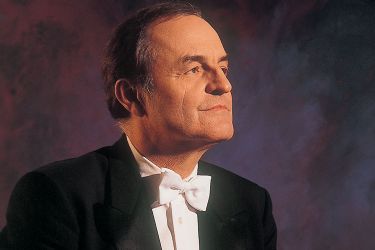|
Symphony
MYSTICAL PLANETS AND LIVELY GERSHWIN ORTIZ AT FINAL SRS CONCERT
by Peter Lert
Sunday, May 4, 2025
Symphony
VSO'S CONCERT MUSIC OF TIME, MUSIC OF PLACE
by Peter Lert
Sunday, April 27, 2025
Choral and Vocal
VOCAL ELEGANCE AND FIRE AT THE 222'S RECITAL APRIL 26
by Pamela Hicks Gailey
Saturday, April 26, 2025
CANTIAMO SONOMA SINGS AN INSPIRED GOOD FRIDAY MOZART REQUIEM CONCERT
by Pamela Hicks Gailey
Friday, April 18, 2025
DRAMATIC SHOSTAKOVICH SYMPHONY CLOSES PHILHARMONIC'S 25TH SEASON
by Terry McNeill
Sunday, April 13, 2025
LARGE COLLEGE OF MARIN AUDIENCE GREETS STOPHER ARTISTRY
by Terry McNeill
Saturday, April 5, 2025
Chamber
FRISSON DELIVERS SHIVERS OF DELIGHT
by Abby Wasserman
Sunday, March 30, 2025
OLD AND MOSTLY NEW IN SRS MARCH CONCERT IN WEILL
by Peter Lert
Saturday, March 22, 2025
Symphony
TWO FORMIDABLE SYMPHONIES AND PURPLE MOUNTAINS AT SRS CONCERT
by Peter Lert
Sunday, February 23, 2025
Chamber
THE PARKER CAPTURES DEMANDING ADES QUARTET AT RAC SEBASTOPOL CONCERT
by Peter Lert
Saturday, February 15, 2025
|
 |
 Conductor Charles Dutoit |
CHAMPAGNE ORGY OF SWISS ORCHESTRA'S SOUND IN WEILL
by Terry McNeill
Saturday, February 14, 2015
Orchestras on tour usually perform hefty display works to showoff their virtuosity and power. And so it was with the Orchestre de la Suisse Romande (OSR) Feb. 14 in Weill Hall. Big works, weighty display. And in a surprise the compositions by Stravinsky and Ravel in the second half did the rare thing of upstaging a popular Rachmaninoff piece with piano.
Debussy’s Ibéria opened the concert and the performance established the OSR as a resplendent ensemble with a charismatic leader. Conductor Charles Dutoit directed in a taught reading where the Spanish flavor of the 1908 tone poem only appeared near the end with the sound of castanets, trombone slides and glowing melodies in the bassoons. and oboes.
Mr. Dutoit has a direct but never extravagant podium style, using the score for each of the four works and conveying cues effortlessly to the 80-person OSR, all clad in black with the men in tails and the women in stylish dresses and pant suits.
The overshadowed item was Rachmaninoff’s Rhapsody on a Theme of Paganini, Op 43, with Mr. Dutoit and pianist Nikolai Lugansky in happy agreement about tempos and phrasing. In many ways it’s a more difficult work to perform than Rachmaninoff’s C and D-Minor Concertos, as many of the variations and tricky rhythms can cause ensemble problems. But here all was in place with the soloist’s sure technical command in evidence in the flashy cadenza of Variation 15 and inimitable playing from the brass. That said, it was a conventional performance with orthodox phrasing and style. Pleasing in every way but a bit prosaic, even at the repeated “Dies Irae” plainchant motifs so familiar with this composer. At the end the audience recalled Mr. Lugansky three times but there was no encore. Concertmaster Bogdan Zvoristeanu played compelling solos as he did throughout the evening
Mr. Dutoit led a concluding half that was a champagne orgy in sound, beginning with Stravinsky’s Song of the Nightingalesuite from his ballet. Here the playing from the entire wind section, especially from flutists Sarah Rumer and Loïe Schneider, was brilliant, and the conductor carefully managed the many short inter-section duos: solo violin and winds, trumpets and strings, harps and celesta.
Sonic splendor continued with a performance of Ravel’s Daphnis and Chloe Suite No. 2, another work extracted from a ballet. The French’s composer’s style, so familiar from the Mother Goose Suite and Impressionist piano works, brought forth gorgeous string playing, and Mr. Dutoit’s command of changes of volume and orchestral texture was faultless. Again solos from the winds were shapely and Mr. Dutoit clearly has this music in his Swiss (and surely Gallic) blood, controlling the knotty Danse Générale with a fluid but precise beat.
I have heard many Weill Hall ovations that have been louder than the one the OSR received, but perhaps none longer. The audience of 1,100 adopted a European-style of approval with stamping feet and continuous applause, and the conductor was called out four times. An encore was not forthcoming and Mr. Dutoit finally waved his hands, signaling that the musicians wanted to finally leave what had been a memorable concert.
|

